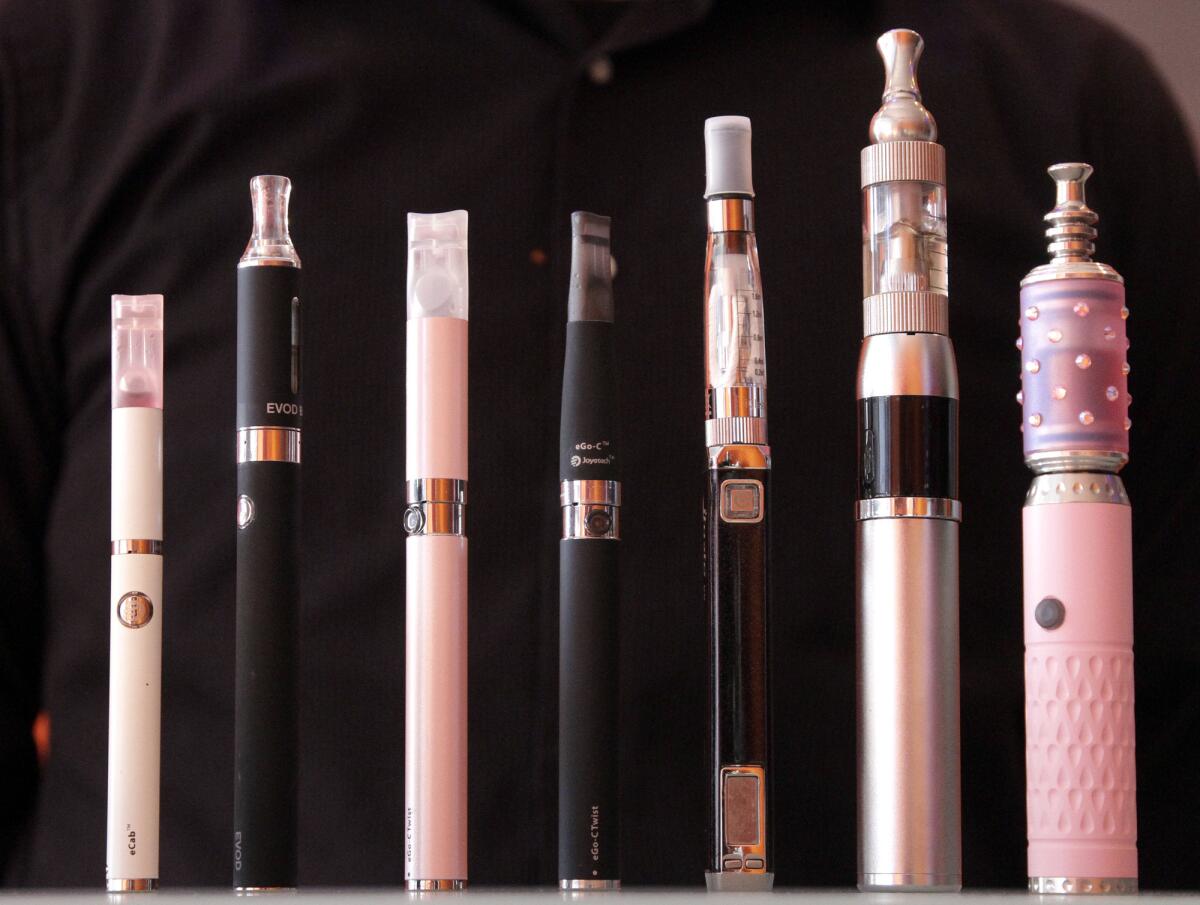Teen vaping leads to teen smoking, new study suggests

A new study of high school students in Hawaii finds that students who tried electronic cigarettes are far more likely than their nonvaping classmates to try regular cigarettes.
New survey results from high school students suggest that health officials have good reason to fear electronic cigarettes: Teens who said they had used the vaping devices were far more likely than their peers to try regular cigarettes over the next year.
Among nonsmoking students who had vaped when they took an initial survey, 20% said they had smoked their first regular cigarette by the time they took the survey again one year later. Among nonsmokers who hadn’t used e-cigarettes when they took the first survey, 6% had tried regular cigarettes a year later.
“E-cigarettes had a risk-promoting effect for onset of smoking,” researchers reported Monday in the journal Tobacco Control.
The study authors, led by Thomas Wills, a cancer-prevention expert at the University of Hawaii in Honolulu, surveyed more than 2,000 high school students from around Oahu. In 2013 and again in 2014, the students were asked whether they had ever smoked electronic or regular cigarettes. Those who answered yes were asked whether they did so only once or twice, a handful of times, or used them monthly, weekly or daily.
To encourage honest answers, the students were assured that their survey responses would remain anonymous.
The researchers also asked students a series of questions to gauge their rebelliousness and willingness to seek out new experiences, among other psychological and demographic factors.
The results revealed that 31% of the students had tried an e-cigarette by the time they took the first survey. Most of them were casual users at best — 21% of the survey-takers said they had vaped no more than four times in their lives, while 2% said they vaped daily and 3% said they vaped a few times per week.
All of these students were more likely to give regular cigarettes a try compared with their classmates who had never used electronic cigarettes. It didn’t matter how much or how often they used e-cigarettes — all vapers were more susceptible to traditional smoking than their nonvaping counterparts, the study authors found.
The researchers used a statistical model to see whether a history of vaping increased the risk of smoking independent of other factors. The results showed that among students who had never smoked in 2013, the risk of at least trying a cigarette by 2014 was 5% for those who hadn’t vaped and 14% for those who had.
Three other things were associated with an increased risk of trying one’s first cigarette in the year between the surveys: age (the older the student, the greater the risk), ethnicity (whites and Native Hawaiians were more likely to initiate smoking than Asian Americans) and rebelliousness (the more defiant, the greater the risk).
The surveys also revealed that 10% of the students who had not used e-cigarettes by 2013 went on to try them by 2014. This risk was greater for students who had the impression that e-cigarettes were less dangerous than regular cigarettes, the researchers found.
See the most-read stories in Science this hour >>
Importantly, the study authors said they found no support for the idea that electronic cigarettes helped teen smokers wean themselves off traditional cigarettes. High school vaping had no association with a decrease in cigarette smoking between 2013 and 2014, they wrote.
The results “provide support for the hypothesis that e-cigarette use may promote initiation of smoking,” the authors wrote. “These findings should be considered for policy discussions about the availability of e-cigarettes to adolescents.”
Hawaii has been on the forefront of efforts to fight teen smoking. Last year, the 50th state became the first in the nation to raise its smoking age to 21. As of Jan. 1, that age limit applies to e-cigarettes as well.
Follow me on Twitter @LATkarenkaplan and “like” Los Angeles Times Science & Health on Facebook.
MORE SCIENCE NEWS
Bizarre birth defect is on the rise, and researchers are baffled
‘Pluto killer’ calls on other astronomers to help find a ninth planet
California’s controversial wolf-management plan to be discussed at Cal State Long Beach







